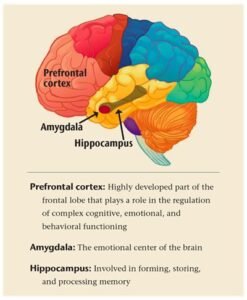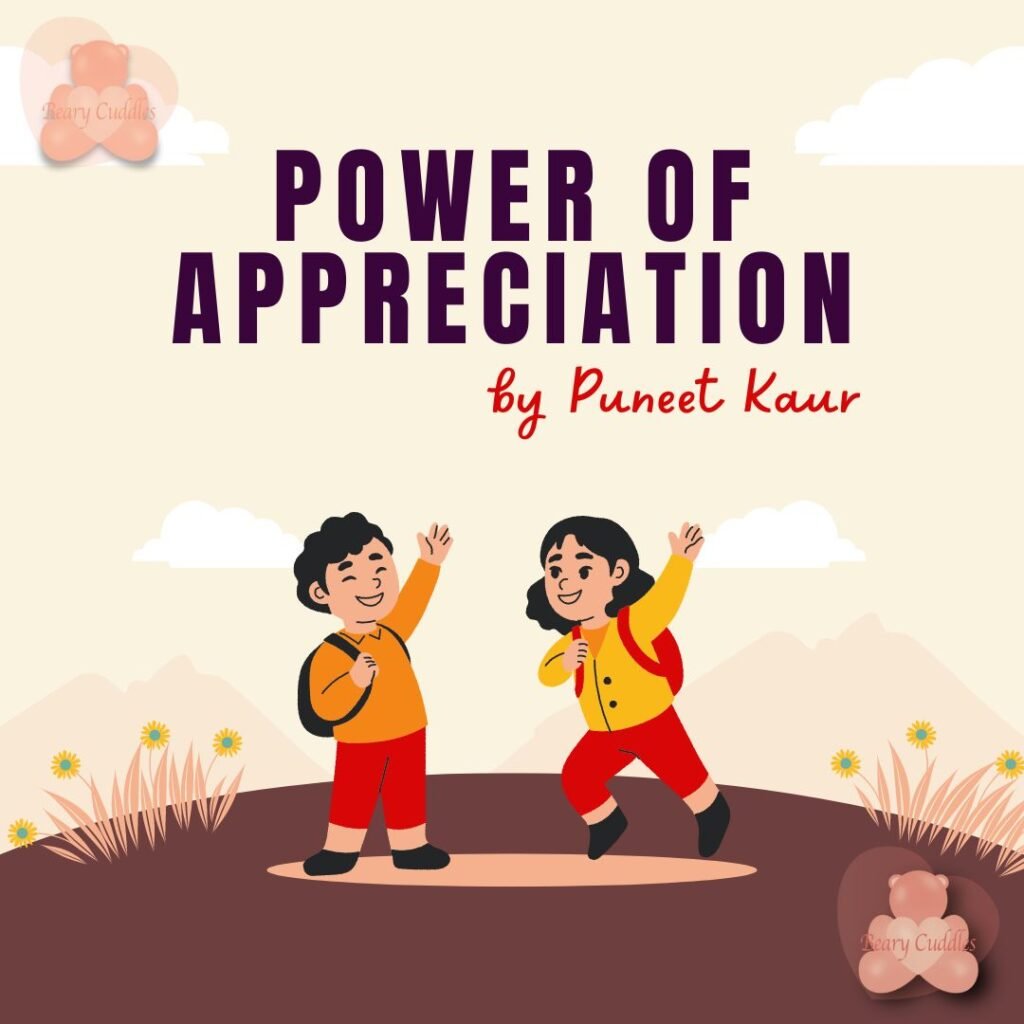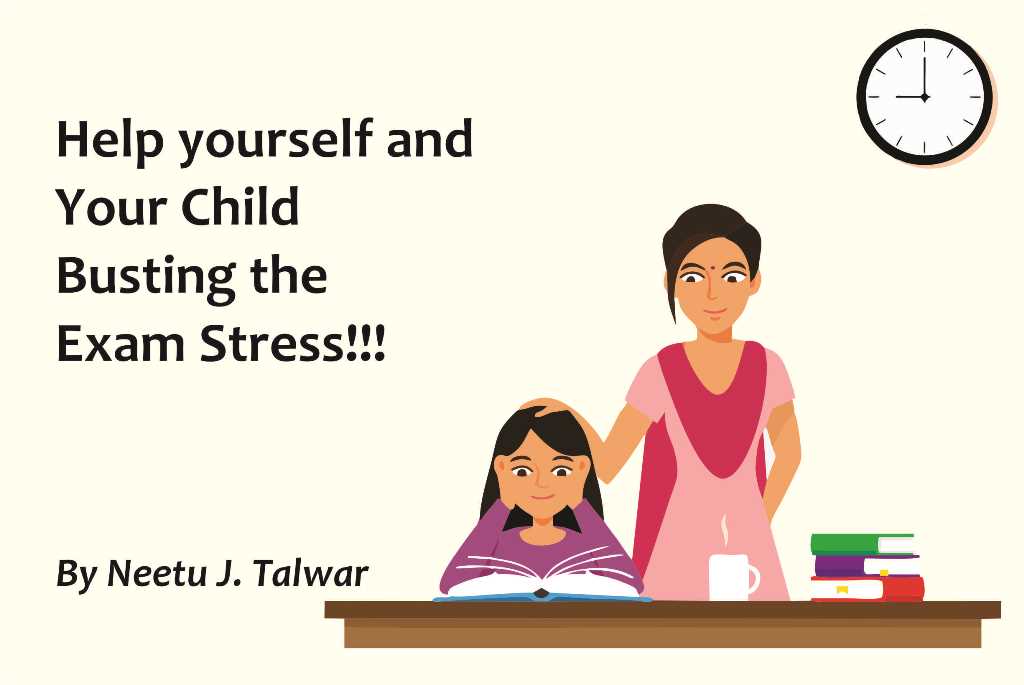
The Hidden Cost of Constant Scolding: What It Does to a Child’s Brain
A recent news report about a teenager leaving home due to excessive parental scolding for studies has raised an important question: What happens to a child’s brain when they are constantly criticized?

Neuroscience shows that frequent scolding activates the amygdala, the brain’s fear center, leading to heightened stress levels. Chronic stress can shrink the hippocampus, affecting memory and learning, while overactivating the prefrontal cortex, which regulates emotions. Studies reveal that children exposed to harsh parenting are at a higher risk of anxiety, depression, and self-esteem issues.
A 2023 study from Harvard University found that children who frequently experience verbal aggression from parents exhibit brain activity similar to those exposed to physical abuse. Another study by the American Psychological Association reported that 62% of children subjected to constant yelling struggle with emotional regulation in adulthood.
Constant criticism doesn’t just affect emotional well-being, it also impacts social skills. Children raised in high-stress environments may develop difficulties in forming healthy relationships and trusting others. Over time, these struggles can manifest in academic performance and professional settings, limiting their potential for success.
So, what’s the solution?
We need to work on providing healthy and congenial environment to the children for their proper all round development.
Reframe your words, replace criticism with constructive conversations. Instead of “Why can’t you ever listen?” try “Let’s figure this out together.” Creating a safe emotional space fosters trust, resilience, and stronger parent-child bonds.

It’s essential for parents to practice mindful communication. Using positive reinforcement, active listening, and emotional validation can significantly improve a child’s self-worth and confidence. Simple acts of empathy and patience can transform a child’s outlook on life and strengthen the parent-child connection.
Parenting is tough, but emotional safety is the foundation of a child’s well-being. Let’s break the cycle of fear-based parenting and build homes filled with understanding and support.
#Parenting #ChildDevelopment #MentalHealth #PositiveParenting
Nurturing Hearts: The Role of Parents and Grandparents in Developing Empathy in Children

EMPATHY – Children, Parents and Grandparents
Princy is a small, cute girl who is always on the go. She used to mingle with others easily. However, she gets emotional over small things. She accidentally broke her friend’s new lunch box while running around the classroom desk. She got scared and started crying. After reaching home, she explained this to Grandma. Princy’s mother became enraged and began scolding her for her careless attitude.
“You’re shouting at a small girl, so why are you shouting at her?” Grandma interjected.
Is this an example of a lack of empathy? Do you believe Grandma’s intervention will have any effect on empathy?
In this case, the need for Princy must be examined.
Mothers’ motives are to be understood.
In addition, the grandmother’s previous experience with similar cases must be considered.
As her grandmother said, Princy, being a small child, needs support and guidance. The mother’s motivation is to correct her child and to have the child be “good” in her opinion (what constitutes “good” is a difficult fact…). The grandma, who is experienced, clearly understood the needs of the child; rather, she was aware of how to handle the child at that point in time.
Experience definitely matters, but in general, especially in the case of parenting, unless we have a guideline, have to wait for occasions to learn and gain experience. For the mother, who is less experienced in comparison with the grandmother, she might not be in a position to think of the needs of the child at that time.
Most of the time, we understand the literal meaning, but we are not always able to implement it whenever we need it. The word “empathy” is used frequently, but very few understand the other person’s emotional condition and motive.
While analyzing an incident, we are only able to understand the action we took and what it was supposed to be. Empathy is more than a feeling of sympathy for another person. So, when we are trying to put ourselves in another person’s place, we are about to understand his feelings and experiences. This is not that simple, but also that difficult.
In parenting, the empathy part can make marvelous changes in the relationship. A secure attachment is about the security, care, and protection of our child. We are less likely to become angry or aggressive if we can cognitively understand his/her point of view. Also, we may not respond poorly to the child. A well-developed emotional empathy makes us well connected with the child’s inner emotional world. A secure parent-grandparent-child attachment will definitely help improve the emotional and psychological health of children, which assures their care and protection.
Role of parents in developing empathy
Parenting is a complex and rewarding job, and having empathy is an important part of being a successful parent. Parents need to be able to understand and share the feelings of their children. This allows parents to relate to their children’s experiences, which helps foster a strong connection between them and their children. Empathy is also essential for providing the love and support that children need to develop into confident and secure adults. Parents who demonstrate empathy are better able to recognize their children’s feelings and provide appropriate guidance and discipline. In addition, children with parents who are empathetic are more likely to develop healthy relationships with their peers and adults. Empathy is one of the most important skills for parents to have in order to ensure their children feel loved and supported.
Role of grandparents in developing empathy
Grandparents play a crucial role in developing empathy in their grandchildren. They provide a unique source of comfort and unconditional love that can help children understand and appreciate the feelings of others. Grandparents can also offer wisdom and insight on social issues, allowing children to gain a better understanding of how their actions can affect those around them. Additionally, grandparents can help children practice the art of active listening and problem-solving skills, which are essential for developing empathy.
Grandparents can also provide grandchildren with opportunities to interact with people of different ages, backgrounds, and beliefs, further enriching their understanding of the world. Ultimately, grandparents can be a lifeline of support and compassion, which can help foster empathy in their grandchildren.
How to develop empathy in Children
To develop empathy in children, consider reading stories that emphasize understanding and acceptance of different perspectives.
Encourage your children to practice perspective-taking by asking them to imagine how someone else might be feeling or how they might view a situation differently.
Spend quality one-on-one time with each of your children, and ensure you ask them open-ended questions.
Model empathy by actively listening to your children and expressing understanding when they share their feelings.
Help your children practice self-awareness by encouraging them to reflect on their own thoughts and feelings.
Provide opportunities for your children to volunteer or serve in their community.
Teach them how to recognize and manage their emotions.
Discuss how to handle disagreements in a respectful and constructive way.
Make sure to show appreciation for your children’s efforts and successes.
Lastly, show empathy to others in your daily life, as parents can become an example for their children.
Few Challenges in Developing Empathy
Developing empathy within a family can present several challenges. Some of the areas I have personally experienced include mood changes in both children and parents, the dynamics of a nuclear family, and the demands of a busy life.
The behavior of parents towards their children may not always align with the children’s preferences, especially in situations where parents make decisions, they believe are beneficial for their children.
Children often encounter difficulties in situations where others do not show empathy towards them.
The Hidden Power of Understanding Child Psychology During Exams

“Every child is an artist. The problem is how to remain an artist once we grow up.” — Pablo Picasso.
This quote beautifully encapsulates the fragile yet resilient nature of children. During exams, their minds become a battlefield of emotions, self-doubt, and expectations. As parents, understanding their psychology can transform this stressful period into an opportunity for growth and self-discovery.
Exams are not just about testing knowledge; they are also a test of emotional resilience.
For children, the pressure to perform often stems from their innate desire to please their parents and meet societal expectations. This burden, if not managed carefully, can lead to anxiety, low self-esteem, and burnout.
Understanding how your child thinks and feels during this time is crucial to providing the right support.
Child psychology teaches us that a child’s belief in their own abilities is a cornerstone of their performance. When children feel supported and believed in, they are more likely to approach exams with confidence. As a parent, your words and actions have the power to either build their self-belief or diminish it.
Avoid statements like, “Why can’t you study like your sibling?” or “You’ll never get good grades with this attitude.” Instead, focus on affirmations such as, “I see that you are putting up your best efforts and that’s important,” or “You’re capable of overcoming any challenge.” These positive reinforcements can rewire their mindset for success.
Research in child psychology highlights that stress activates the fight-or-flight response, even in children. This can lead to memory lapses, difficulty concentrating, and even physical symptoms like headaches or stomachaches. It’s vital to teach your child that stress is not the enemy. Stress, when managed, is a natural motivator. Share this perspective with them: “Stress is your mind’s way of telling you that this moment matters. Let’s work together to channel it into focus.”
One powerful tool from NLP (Neuro Linguistic Programming) is visualization technique.
- Encourage your child to close their eyes and picture themselves walking into the exam hall, calm and confident.
- Ask them to imagine writing their answers effortlessly and seeing their name on a results sheet with excellent grades.
This mental rehearsal can help reduce anxiety and instill a sense of preparedness.
Another technique is anchoring, borrowed from NLP (Neuro-Linguistic Programming).
- Help your child create a physical anchor for calmness, such as pressing their thumb and forefinger together while thinking of a serene moment.
- Practicing this regularly can make it a quick go-to during moments of panic.
Resilience Through Communication
Open communication works wonders in understanding your child’s emotional state. Instead of asking, “How much have you studied?” try asking, “How are you feeling about your preparation? Do you need any help?” This small shift encourages them to open up about their fears and concerns. Listening without judgment creates a safe space where they feel valued and understood.
Support Without Pressure
Parents often unknowingly cross the line between supporting their child and pressuring them. It’s essential to remember that every child’s journey is unique. Celebrate their efforts, not just their results. Acknowledge their hard work, regardless of the outcome, and remind them that exams are just one chapter in a much larger story.
As parents, we hold the key to shaping our children’s relationship with exams—and with themselves. Instead of focusing solely on grades, focus on their growth. Teach them that target is learning, not certain % and getting lesser marks is not a failure, let it be an experience and nothing more . Remind them that their worth is not defined by a report card.
In the words of Carl Jung, “Children are educated by what the grown-up is and not by his talk.” Be the calm, confident presence they need during this challenging time. Equip them with the tools to manage stress, and watch as they not only succeed in exams but also in life.
The Importance of Consensus Among Parents: Building a Stronger Foundation for Our Children.
The Importance of Consensus Among Parents: Building a Stronger Foundation for Our Children
In today’s fast-paced and ever-evolving world, parenting can often feel like navigating a complex maze. With various influences from technology, education, and societal norms, parents face unique challenges that require careful consideration and collaboration. One of the most crucial aspects of effective parenting is achieving consensus among parents—whether they are in a single household or co-parenting across different homes. This agreement not only strengthens family dynamics but also sets a stable foundation for children to thrive.
- Creating a Unified Front:
When parents are on the same page regarding values, rules, and expectations, it fosters a sense of security for children. A unified approach helps prevent confusion and anxiety. For instance, if one parent allows screen time while the other enforces strict limits, it creates an environment of inconsistency. Children thrive when they know what to expect, and a consensus helps establish clear boundaries that contribute to their emotional well-being.
- Modelling Healthy Relationships:
Consensus among parents exemplifies the importance of cooperation and compromise—key components of any healthy relationship. When children observe their parents working together, they learn vital social skills, such as conflict resolution, empathy, and teamwork. These lessons become foundational for their future relationships, whether with peers, colleagues, or partners.
- Enhancing Communication Skills:
Establishing consensus requires open and honest communication. When parents engage in discussions about their parenting approaches, they model effective communication for their children. This process not only strengthens the parents’ relationship but also teaches children how to express their thoughts and feelings respectfully and constructively. In an age where digital communication dominates, fostering face-to-face discussions can significantly enhance emotional intelligence.
- Supporting Emotional Development:
Children are highly perceptive and often pick up on tension between parents, which can lead to feelings of anxiety or insecurity. A cohesive parenting strategy minimizes conflict and fosters a nurturing environment. When parents agree on how to handle emotional situations—like addressing bullying or academic pressures—children feel more supported. They learn to navigate their emotions, knowing they have a reliable support system.
- Encouraging Consistency in Discipline:
Discipline is an essential aspect of parenting that requires consistency to be effective. When parents have a shared understanding of disciplinary methods, children are less likely to test boundaries. This uniformity helps children understand the consequences of their actions, encouraging responsible behavior
. Furthermore, consistent discipline reinforces the idea that actions have predictable outcomes, which is a crucial lesson in personal responsibility.
Consensus among parents helps create a cohesive family identity. When both parents actively participate in decision-making, children feel valued and understood. This collaborative spirit nurtures a sense of belonging, which is vital for self-esteem and confidence. Whether through shared family traditions or collective problem-solving, children grow up knowing they are part of a supportive unit.
Parenting is a journey filled with challenges and learning opportunities. When parents come together to share insights, experiences, and resources, they not only grow individually but also enrich their parenting approach. This commitment to lifelong learning sets an excellent example for children, teaching them the importance of adaptability and growth.
- Conclusion
Achieving consensus among parents is not always easy, but its importance cannot be overstated. A unified approach enhances communication, emotional development, and discipline while modelling healthy relationships for children. As parents, investing time and effort into finding common ground creates a nurturing environment where children can flourish. By prioritizing consensus, we empower our children with the tools they need to navigate life’s challenges and emerge as confident, well-adjusted individuals.
In this ever-changing world, let’s strive to work together, fostering a loving and supportive atmosphere that echoes through generations. 
Significant Leaps to Appreciation
Over the years, growing up as a child, I carried a belief that you are appreciated and praised in life only when you are successful. Award is given only to winners. Tough competitions and struggles divided my mindset into only two categories- winners and looser. Praise and acknowledgement is served only to the best. The rest land nowhere. Either there is disappointment and loss or there is an applause and award. This ended up to create my fighter ideology.
Unless I performed well, I was never satisfied. Love was unconditionally offered but praise had to be earned not just with efforts and hard work but getting brilliant an outstanding results. Appreciation was conditional. If I do well, I have reward. And if I do bad, I get nothing. The same traditional concept raised me into a college achiever.
My parents endless efforts and sacrifices added to my guilt if I under achieved. But my journey and struggles somewhere remained unnoticed. I was never criticized, punished or ignored. But had to level up to a commendable benchmark which when not achieved restricted my appreciation or celebration. High hopes set on me to walk the achievers platform only brought disappointments and low self-esteem. My college course and professors somewhere brought back the spirit of determination and achievement as the course I studied offered self-exploration and I realized that I had a long way to go. For the first time, I got remarks in my files such as:-“painstaking efforts, praiseworthy thoughts, written with efforts and dedication” instead of just good, very good, excellent or just a signature. For the first time I felt somebody appreciated my hard work and efforts. It greatly motivated me back to become progressive and successful in pursuing my career.
To meet social expectations and fulfill personal needs of recognition, like many kids I put myself through stifle pressure and tireless efforts.
Usually, in the long run children who handle such situations end up killing their spark by giving up on their dreams or exhaust themselves to prove their capacity. Either of which is unhealthy. I chose to over work and devote my energies solely into this race.
Grades, marks were of great value and to get into the best of institutions, one had to crack competitive exam. But somewhere I found relief amidst all this pressure by focusing on doing what I enjoyed. But my basic zest of achievement that was ingrained so deeply returned back when I got a child of my own. I never negated or criticized her but internally had expectations from her too. Soon to realize that I do not want her to go through the same thing. I was open to the view due to my exposure and learnings that I have to be her support. She will take her own time to reach her full potential and I will not pressurize her for those outstanding results. I clapped at her every step when she learnt to walk, talk, play and do her tasks but slowly with time when academic pressure came, I forgot to appreciate that her improper circles also need appreciation.
The fact that the little things that are not perfect also deserve appreciation. Only then they grow better. It’s a basic human need.
In life also, we must have gratitude for every little thing. Power of appreciation gives encouragement, positivity and new hope in times of pain, frustration and anger and allows the person to constantly stay motivated when one has a lost sense of direction.
“It is like a bridge to victory which we fail to acknowledge” or “a rechargeable battery that repowers you” when everything is grey and cloudy.
It shifts our focus to see the good instead of just focusing upon the missing puzzle pieces thereby working more effectively in developing positive behavior and habits. A very positive environment is created and the child cannot get a better space than this to grow. We tend to overlook its advantages in the long run under the belief that it may spoil the child but it truly helps to shape the personality of the child to become progressive, more positive, resilient, more unstoppable and open to new experiences in life. So as rightly said “there are things to say besides just good job” and “praise can transform a prison into a temple”.
-By Puneet Kaur
Power of appreciation
 The Power of Appreciation in Child Development:
The Power of Appreciation in Child Development:
Six Principles to Nurture Growth.
Appreciation is a cornerstone of healthy child development. It shapes a child’s self-esteem, motivation, and social skills. When children feel valued and recognized, they are more likely to thrive in their learning and interactions. Here are six essential principles of appreciation that can enhance your approach to nurturing a child’s growth.
- Be Specific When Praising
Vague praise like “Good job!” often falls flat. Instead, be specific about what you’re acknowledging. For instance, saying, “I loved how you shared your toys with your friend today!” not only highlights the positive behaviour but also reinforces the value of sharing. Specific praise helps children understand what they did well, encouraging them to repeat those behaviours.
- Praise the Efforts/Progress, Not Only Results
Focusing solely on outcomes can create pressure and fear of failure. Instead, celebrate the effort and progress a child makes, regardless of the final result. For example, saying, “I’m so proud of how hard you worked on that puzzle!” emphasizes perseverance and resilience. This approach fosters a growth mindset, teaching children that effort is just as important as success.
- Praise and Correction Should Be at Separate Times
Mixing praise with correction can confuse children and undermine the effectiveness of both. When you need to offer constructive feedback, do so separately from praise. For example, acknowledge their hard work first, then address areas for improvement later. This strategy allows children to fully absorb your appreciation without feeling overwhelmed by criticism.
- Praise Must Be Genuine and Sincere
Children can sense insincerity, which can lead to distrust and diminish their motivation. Make sure your praise is heartfelt and authentic. If you struggle to find something to praise, take a moment to observe your child’s efforts closely. Genuine appreciation fosters a strong emotional connection and encourages children to take pride in their achievements.
- Praise in Public – Correct in Private
Public acknowledgment can boost a child’s confidence and reinforce positive behaviour. When a child does something commendable, celebrate it openly—like praising their performance in front of family or friends. However, keep corrections private to maintain their dignity and self-esteem. This balance helps children feel valued while also supporting their growth.
- Accentuate the Positive
In every situation, there are opportunities to focus on the positives. By highlighting what children do well, you create an environment where they feel safe to explore and take risks. Instead of saying, “You missed a few questions on that test,” you could say, “You did really well on the questions you understood!” This encourages a sense of accomplishment and motivates them to keep trying.
- Conclusion
The power of appreciation in child development is profound. By applying these six principles, you can help nurture a child’s self-esteem, resilience, and overall well-being. Remember, appreciation is not just a response; it’s a vital part of parenting and teaching. By making appreciation a regular practice, you contribute to a positive and supportive environment where children can flourish.
Start today: how can you show appreciation to a child in your life?
Multiple Intelligence
The theory of multiple intelligences was developed in 1983 by Dr. Howard Gardner, professor of education at Harvard University. It suggests that the traditional notion of intelligence, based on I.Q. testing, is far too limited. Instead, Dr. Gardner proposes eight different intelligences to account for a broader range of human potential in children and adults. These intelligences are:
- Linguistic intelligence (“word smart”)
- Logical-mathematical intelligence (“number/reasoning smart”)
- Spatial intelligence (“picture smart”)
- Bodily-Kinesthetic intelligence (“body smart”)
- Musical intelligence (“music smart”)
- Interpersonal intelligence (“people smart”)
- Intrapersonal intelligence (“self smart”)
- Naturalist intelligence (“nature smart”)
Dr. Gardner says that our schools and culture focus most of their attention on linguistic and logical-mathematical intelligence. We esteem the highly articulate or logical people of our culture. However, Dr. Gardner says that we should also place equal attention on individuals who show gifts in the other intelligences: the artists, architects, musicians, naturalists, designers, dancers, therapists, entrepreneurs, and others who enrich the world in which we live.
Unfortunately, many children who have these gifts don’t receive much reinforcement for them in school. Many of these kids, in fact, end up being labeled “learning disabled,” “ADD (attention deficit disorder,” or simply underachievers, when their unique ways of thinking and learning aren’t addressed by a heavily linguistic or logical-mathematical classroom.
The theory of multiple intelligences proposes a major transformation in the way our schools are run. It suggests that teachers be trained to present their lessons in a wide variety of ways using music, cooperative learning, art activities, role play, multimedia, field trips, inner reflection, and much more. The good news is that the theory of multiple intelligences has grabbed the attention of many educators around the country, and hundreds of schools are currently using its philosophy to redesign the way it educates children. The bad news is that there are thousands of schools still out there that teach in the same old dull way, through dry lectures, and boring worksheets and textbooks. The challenge is to get this information out to many more teachers, school administrators, and others who work with child
Multiple Intelligence Theory

The theory of multiple intelligences was developed in 1983 by Dr. Howard Gardner, professor of education at Harvard University. It suggests that the traditional notion of intelligence, based on I.Q. testing, is far too limited. Instead, Dr. Gardner proposes eight different intelligences to account for a broader range of human potential in children and adults. These intelligences are:
- Linguistic intelligence (“word smart”)
- Logical-mathematical intelligence (“number/reasoning smart”)
- Spatial intelligence (“picture smart”)
- Bodily-Kinesthetic intelligence (“body smart”)
- Musical intelligence (“music smart”)
- Interpersonal intelligence (“people smart”)
- Intrapersonal intelligence (“self smart”)
- Naturalist intelligence (“nature smart”)
Dr. Gardner says that our schools and culture focus most of their attention on linguistic and logical-mathematical intelligence. We esteem the highly articulate or logical people of our culture. However, Dr. Gardner says that we should also place equal attention on individuals who show gifts in the other intelligences: the artists, architects, musicians, naturalists, designers, dancers, therapists, entrepreneurs, and others who enrich the world in which we live. Unfortunately, many children who have these gifts don’t receive much reinforcement for them in school. Many of these kids, in fact, end up being labeled “learning disabled,” “ADD (attention deficit disorder,” or simply underachievers, when their unique ways of thinking and learning aren’t addressed by a heavily linguistic or logical-mathematical classroom. The theory of multiple intelligences proposes a major transformation in the way our schools are run. It suggests that teachers be trained to present their lessons in a wide variety of ways using music, cooperative learning, art activities, role play, multimedia, field trips, inner reflection, and much more. The good news is that the theory of multiple intelligences has grabbed the attention of many educators around the country, and hundreds of schools are currently using its philosophy to redesign the way it educates children. The bad news is that there are thousands of schools still out there that teach in the same old dull way, through dry lectures, and boring worksheets and textbooks. The challenge is to get this information out to many more teachers, school administrators, and others who work with child.
Help Yourself and Your Child Busting the Exam Stress !!!

Help Yourself and Your Child Busting the Exam Stress!!!
Parents easily get stressed when the exam time of the children draw closer. Exams can really be stressful for the entire family, but in reality, it needn’t be this way. It’s understandable that the child will experience stress and anxiety. If we as parents stress out, kids will stress out even more. Instead of putting additional pressure, there is a lot that parents can do motivate their kids for scoring well and prepare systematically for their exams.
Here are 10 practical and handy tips for the parents that will help them prepare their kids score well in the exams and reduce stress:-
- Know your child’s Exam time table – A very helpful way to help reducing yours and your child’s stress during their exams. Parents must know what exam the child has got next in order to help them prepare on time. It proves to be an extra element of support. You can simply add it to your calendar or pin a copy of the exam time table onto the notice board.
- Regular monitoring of their studies– Always take some time out to monitor your child’s progress. Sit with your child and design a schedule so that he or she has enough time for revision. Lending a helping hand in building a useful schedule for their days and weeks will help them efficiently utilizing their time. Don’t let them putting off all the preparation for the last days.
- Cut back on distractions– Any distractions, be it TV, gadgets, phones, gatherings, parties or even a disturbance from siblings must be avoided. It’s imperative to give your child the right atmosphere during exams to make him perform and score well. Try to allocate a comfortable room or a space in the home for your child to study in peace.
- Do not compromise on child’s nutrition – Your Child health might get affected while dealing with exams pressure. An extra and special care is very much required keeping in mind the pressure child has on his mind. Adding fresh and seasonal fruits may do wonders for them. It helps them improving their concentration levels.
- Enough sleep is fundamental – Be it school or exam, enough sleep is essential for a child to perform well. Teenagers have a habit of catching up on social media before bed which can cut the sleep time resulting in them being tired right before their exam. Prohibiting device in bedroom especially during exams or cutting off the internet is highly recommended. Installing parental control is also advisable during exam time.
- Help them to be active – Encourage them to take breaks between studies. As studying continuously will tire out the brain and affect the ability to retain knowledge. A power nap, stretching exercises, listening to music OR dancing can refresh and re-energize them. Processed food, high caffeine or sugar intake can make kids anxious during exam days. Teenagers are recommended not to exceed 100 ml of caffeine a day. Encourage them to take plenty of water.
- Never compare your child – Comparing your child with other kids, using negative words to demean them, or questioning their caliber on the basis of scores will just hurt the sentiments of the child. His true potential shouldn’t be measured with scores in the exams. Parents must remember that exams are just one of the many challenges your child will face and it’s not the end of life. So, take it easy!
- Reward your child efforts- Rewarding your child is important to motivate them to put their best foot forward. Don’t bribe them with expensive gifts. A simple family outing or catching up with friends or cousins after the exam can help the child to take his pressure off.
- Identifying warning signs, if any – Its imperative to ensure your child’s mental well-being too. It’s natural to feel anxious during exams. But if there are signs of extreme anxiety, loss of appetite, anger issues or irritated mood, these could indicate that the child is not keeping well. Always keep a check, intervene and talk to them at the right time.
- Stay calm – Don’t build too much pressure on them. Stand in support of your child, believe in his abilities, help them preparing for the exams without overburdening them with your expectations.
So, stay calm! And if you can’t, fake it till you make it. Try to hold your stress inside and not to discuss with your child.
Hope these tips will help you and your child staying stress free in the days of examinations. These tips will not only help them coping with stress but will also form the right outlook for exams.
Author
Neetu J. Talwar
ESL Trainer and Parenting Coach from Deep















